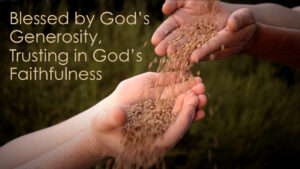There is a Time to Speak
Ecclesiastes 3:1-8 “…a time to tear, and a time to sew; a time to keep silence, and a time to speak; …”
Over the last couple of years, I heard it asserted that if a Christian brother or sister refuses to have a biblical discussion with another Christian who desires to speak with them, they are in sin. This is a foolish blanket assertion that no mature Christian should be trying to establish. Unfortunately, brothers and sisters have been disfellowshipped by this belief. Christians have been shamed, harassed, and broken down into sleepless nights, stress, and tears by it. Division has occurred over it. 
Let us understand that communication is very important to develop strong, healthy relationships. Consider the following article I wrote previously regarding 10 Tips to Improve Communication. How would we be able to develop a relationship with God if we could not hear of Him (I Corinthians 1:18-21, Romans 10:17)? Without communication our encouragement to others would be extinguished (I Thessalonians 5:11). Communication engages the proclamation of the Word, reproving, rebuking, and exhorting. Communication can encompass accusation, concern, love, discussion, revelation, reconciliation, and abandonment (Matthew 18:15-20). Communication should not be minimized as not important.
Communication needs to also be guided BY ALL PARTIES with self-control and characterized by the fruit of the spirit (Galatians 5:22). The first characteristic listed, “love”, has in itself a very important trait. “Love does not seek its own / Does not insist on its own way” (I Corinthians 13:5). Should anyone be exposed to someone endlessly until they are forced to state they agree or were wrong? Unity is important, but it is unlikely to come with the lack of kindness in a “communicate now, according to my rules, over anything we disagree about” type attitude. Any communicator, preacher, elder, that thinks everyone is going to or has to agree with them all the time about everything in regard to the Bible is mistaken. Hebrews 12:14 – “Strive for peace with everyone, and for the holiness without which no one will see the Lord.” Sometimes, communication expresses itself best, by being silent. It is in silence where peace can be found. Proverbs 17:27-28 – “Whoever restrains his words has knowledge, and he who has a cool spirit is a man of understanding. Even a fool who keeps silent is considered wise; when he closes his lips, he is deemed intelligent.”
The last verse mentioned brings us directly to the assertion that: if a Christian brother or sister refuses to have a biblical discussion with another who desires to have the discussion, they are in sin. The Bible acknowledges that there are times it is good to close your mouth. That is part of wisdom. Ecclesiastes 3:1-8, identifies there is a time for everything under the sun. A time to be quiet and a time to speak. The apostles shared the gospel to Jew and gentile. Sometimes, those people were done hearing what was being said. Did the apostles keep on beating a dead horse? No. Matthew 10:14, “And if anyone will not receive you or listen to your words, shake off the dust from your feet when you leave that house or town.” Of course, this can be done from the side of the listener as well. I know a preacher who called another demanding to address a spiritual issue with him. He would not reason with or listen to the preacher he called. Ultimately, the preacher who had received the call had to hang up. Christians do not have to be held hostage to someone who is unreasonable and continually harassing them, demanding they communicate, and showing a lack of courtesy. Sometimes, the listener just gives up, “Give not that which is holy unto the dogs, neither cast ye your pearls before swine, lest they trample them under their feet, and turn again and rend you.” (Matthew 7:6). The Bible is very clear that sometimes silence is acceptable. It is not sin. Proverbs 10:19 “When words are many, transgression is not lacking, but whoever restrains his lips is prudent.” Proverbs 26:4 “Answer not a fool according to his folly, lest you be like him yourself.” Proverbs 21:9 “It is better to live in a corner of the housetop than in a house shared with a quarrelsome wife.” Proverbs 17:14 “The beginning of strife is like letting out water, so quit before the quarrel breaks out.”
Finally, it is important to address this issue with some common sense as Jesus provides an example of in Matthew 22:23-33. It is common sense to understand that sometimes someone does not want to speak to you face to face. Perhaps you have a temper. Perhaps that person is a female and they have had an abusive husband or family member and they do not want to speak to you face to face. Perhaps the person would prefer documentation, time to think about what was said before they respond, time to research what was said to see if it was true (Acts 17:11)? Have you ever had children? A typical day for a parent of a small child sounds like “why, why, why, why”. Eventually, the parent sends the child outside or off to play in a room for a little while. Why? Because they have other more important things to do. Many people have busy lives and if they know that a conversation is going to be extensive, ongoing or even unreasonable, they are not going to continue to carve large amounts of time out of their life for it – especially if they have heard the other side detail their thoughts already. Common sense dictates that some information is none of someone’s business. I know a family who was publicly ostracized by a former eldership, because the family did not want to discuss with them the beliefs of their new congregation. Books could be written about why someone does not have to sit down and have a conversation with someone else every time they desire to do so. Not having a conversation every time someone wants to do so is not a sin.
Are there passages in scripture that encourage communication? Yes. There are also passages which provide a clear message that talking is not always encouraged or necessary. Wisdom understands that time in the hearts of God’s faithful brings many answers, changes of heart, and peace. Wisdom understands that pressuring or forcing yourself upon others will more than not bring about the opposite reaction that you are trying to achieve. Someone isn’t necessarily in sin if they refuse to talk to you. Certainly, they are not in sin if the issue is that you want to force the mode of communication upon them. However, your behavior may very well be the reason they do not want to communicate with you and you may find yourself in sin or creating division if you continue pushing yourself upon them.


